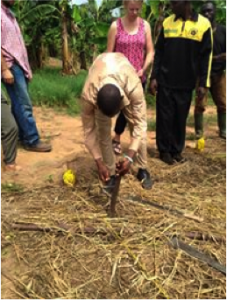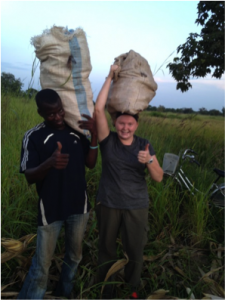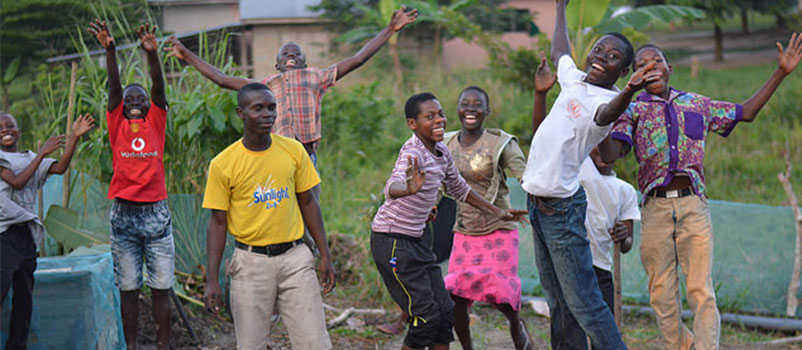We’ve all heard the quote “it’s not what you know, it’s who you know”. I’ve found these words to ring true time and time again. In college there was always a huge emphasis on networking and how those skills and connections can carry over to your professional career.
I’m really not sure why I thought it would be any different here in Ghana.
During our week-long training in Ardmore, OK I remember being terrified by the realization that I would not have all the answers and many doubts filled my head.
What will happen if a farmer invites me to his farm and asks me questions that I don’t know the answers to? And what about my students? What if I can’t answer their questions? Am I even qualified for this job?!
 Now, after living in Ghana for five months I still do not claim to be an expert in Ghanaian agriculture…or agriculture as a whole for that matter. In fact, I am still uncomfortable saying those three dreaded words, “I don’t know”, but what I’ve learned is the importance of adding these three words: “I’ll find out”.
Now, after living in Ghana for five months I still do not claim to be an expert in Ghanaian agriculture…or agriculture as a whole for that matter. In fact, I am still uncomfortable saying those three dreaded words, “I don’t know”, but what I’ve learned is the importance of adding these three words: “I’ll find out”.
What I have come to realize is that the people of my community don’t need me to be an expert. What they need is someone who has the ability to network, identify the gaps in the value chain, and connect the dots to address those gaps. More times than not, it is a simple breakdown in communication that keeps knowledge from spreading and by bridging these gaps we can begin to make small steps in the right direction in progressing agriculture in Ghana.
As an AgriCorps member, a big focus in the work that we do is sustainability. I truly believe that the only way to do this is through the people we work with. For example, I recently invited Armiyaw, a farmer from my community, to attend a training that emphasized the importance of no-till agriculture in Ghana. While the training was extremely informative and well done, this was Armiyaw’s first exposure to no-till agriculture. Unfortunately, it is the dry season in Northern Ghana and planting will not be done until the rains come which can be sometime around the end of May to June. While I am by no means an expert in no-till agriculture, I really wanted to be in Kumbungu for the planting season, however I will be leaving near the end of June. I worried that my absence would discourage Armiyaw from starting a small no-till test plot, which in turn would prevent the knowledge he had gained from the training from spreading to the rest of the community.
One evening I accompanied my roommate, Regina, to go visit our pastor. He wasn’t home so his eldest son, Sampson hosted us. Sampson had noticed my absence from church the week prior and asked me ab out it. I explained to him that I had traveled to Kumasi for a no-till training and I quickly learned that he had actually worked for Dr. Kofi Boa, the man who led the training, and was very knowledgeable about no-till agriculture. He even invited me to come and see his fields! I was ecstatic and couldn’t believe my luck! Armiyaw and I plan to visit Sampson’s fields soon, which will allow the two to exchange contact information. Having Sampson to guide and advise Armiyaw with his no-till test plot will prove to be extremely beneficial and aid in dispersing this knowledge to the community’s farmers. “It’ not what you know, it’s who you know”
out it. I explained to him that I had traveled to Kumasi for a no-till training and I quickly learned that he had actually worked for Dr. Kofi Boa, the man who led the training, and was very knowledgeable about no-till agriculture. He even invited me to come and see his fields! I was ecstatic and couldn’t believe my luck! Armiyaw and I plan to visit Sampson’s fields soon, which will allow the two to exchange contact information. Having Sampson to guide and advise Armiyaw with his no-till test plot will prove to be extremely beneficial and aid in dispersing this knowledge to the community’s farmers. “It’ not what you know, it’s who you know”
As much as I’d like to think that I have it all figured out and that I have all the answers, the reality is that I don’t…and that’s okay. As an AgriCorps member, one of the biggest contributions we can make to our communities is simply connecting the dots. As for me, when it comes to painting the big picture I’ll help connect those dots and create that outline, but I am leaving my community to color it in.
Sarah Tweeten is an Agricultural Communications graduate from Iowa State University. Before becoming an AgriCorps Member, Sarah studied agriculture in Panama and worked with Iowa State Extension and 4-H.


